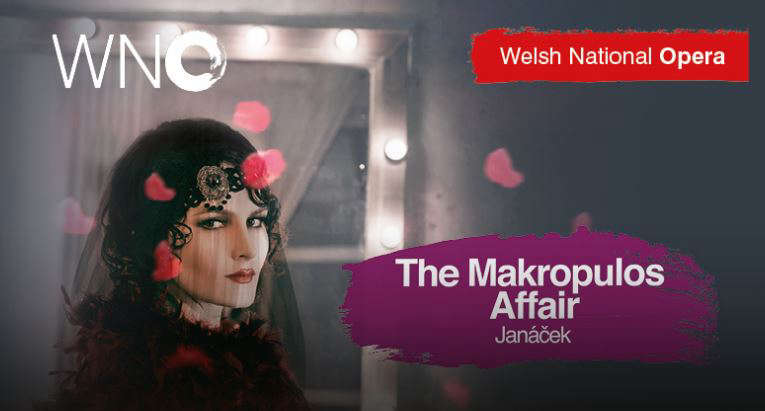
The Makropulos Affair - Janácek
Welsh National Opera - Mayflower Theatre
Reviewed by Verity Babbs
The second of three operas performed at the Mayflower this month by the Welsh National Opera, The Makropulos Affair was this reviewer’s first introduction to opera - and what a superb introduction it was.
Made up of three acts, the opera - composed between 1923 and 1925 by Janácek after the play of the same title by Karen Capek in 1922 - was co-produced with the Scottish Opera and follows the developments of a 30-year legal battle and the mysterious opera star Emilia Marty, performed by Ángeles Blancas Gulin.
The plot is a complicated one: the First Act lays out the legal case which involves several long-dead characters with very similar names, and - in what I presume was a minority Czech-speaking audience - trying to follow surtitles and watch the actors at the same time made it easy to miss key points.
This latter difficulty proved one point, though - that it takes a cast with incredible stage-presence to make you want to watch them at the cost of reading what is actually being said.
One inspired decision by the WNO was to have cast-member Mark Le Brocq enter the stage while the Act 1 scenery was turned to Act 2, going back over the ins-and-outs of the legal battle in question, who was who, and quelling the nervous energy of any of us who might have become slightly boggled.
This also gave us some behind-the-scenes access to how large-scale sets are put together and changed, which was fascinating.
As soon as the curtain fell for the interval, groups in the audience turned to each other to double-check that they did indeed know what was going on - demonstrating the appetite that the WNO had managed to stir-up in their audience to enthusiastically understand the show which we were so thoroughly enjoying.
Were we not enjoying it, we might not have minded not really knowing what was going on.
The set design for this performance was fantastic in its complexity and motif-incorporation.
We began the opera with a film montage which set up recurring themes, and these elements were woven into the backdrop from time to time helping us to ground ourselves.
Incorporating this cinematic element was an excellent decision, and one which helps to bring opera into the modern age.
Far more so, in fact, than trying to “modernise” older scripts by giving Madame Butterfly a mobile phone or making the cast of The Marriage of Figaro wear contemporary clothes.
The set design also cleverly captured the pervading sense of the power of time by discreetly featuring a clock in each act - one hung in the office, a large prop clock laying against the wall of the theatre, and another above Emilia’s bed.
The lighting also changed to reflect the shifting moods and moments, with a particularly excellent example being the changes in Act 3 where the white light in the hotel room changed to an off-yellow at a point of repulsive conflict, and to a colder blue-tint as our protagonist appears to give up hope and shows her true vulnerability.
There were choreographed moments in which parts of the set were incorporated into the scenes which were also truly beautiful, in particular Emilia’s interaction with a flowing curtain in the final act.
It was wonderful to watch a truly complicated character be celebrated on stage, and to see a cast explore how women’s bodies can become an unhappy currency as they move through their lives and experience violence at the hands of men - and for Emilia, generations of the same men.
She is a walking paradox, living her life praised on stage and desired in affairs across the globe, and yet living in deep solitude.
Emilia was one of Capek’s several bold female protagonists, and the author - whose work in science fiction coined the term ‘robot’ in popular culture - gives us a wonderful plot which exemplifies the trouble for women on missions and the men who disrupt them.
The Makropulos Affair asks us what would it mean to live forever, and answers that it is only by not living forever that the events and relationships of our lives have real meaning.
The plot sees Emilia navigate her way through the world over the span of 300 years, which made this reviewer think about quite how much cultural change that time accounts for.
The difference between 1500 and 1800, culturally, seems enormous.
It also brought to mind the potential differences in appetite for opera within a shorter span of time - say, 1920 to 2020.
Does a shortened attention span - due partly to the introduction of electronic entertainment devices - make us less receptive to foreign-language opera in which we must multitask reading and watching?
In a year where the English National Opera did not receive any funding from the Arts Council England, opera is widely seen as inaccessible and only for an older generation, but this production of The Makropulos Affair proves that that needn’t be the case.
As a first-time opera-goer, this production completely won me over.
With a cinematic-like score and a detailed and engaging plot, this was not at all what I had expected from opera.
The musical performances were of course spectacular, but that is one of opera’s most magical elements - you become so fully drawn into the world created on stage and in the pit, that you forget for a moment quite how remarkable what this cast and orchestra are managing to do with their voices and instruments truly is.
More details:
https://wno.org.uk/
Mayflower Theatre


